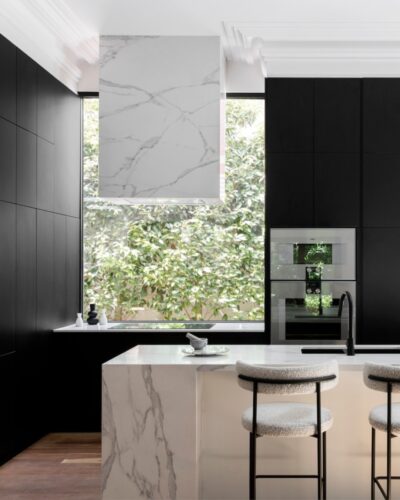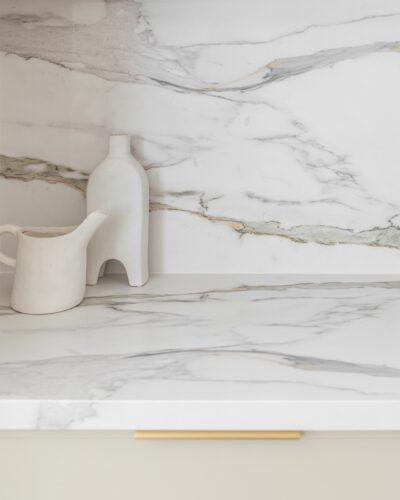Smartstone has introduced a groundbreaking product to the world of surface materials with its new line of sintered porcelain. Smartstone’s sintered porcelain combines the best of natural stone and advanced technology, offering unmatched durability, aesthetics, and environmental benefits.
The Evolution of Smartstone
 Smartstone was founded in 2002 in Australia to provide the market with an affordable and luxurious alternative to natural stone. Over the years, the company has built a reputation for delivering high-quality engineered quartz surfaces that blend beauty with practicality. Due to its exceptional range of colours, patterns, and finishes, Smartstone quickly became a preferred choice for kitchen countertops, bathroom vanities, and various commercial applications.
Smartstone was founded in 2002 in Australia to provide the market with an affordable and luxurious alternative to natural stone. Over the years, the company has built a reputation for delivering high-quality engineered quartz surfaces that blend beauty with practicality. Due to its exceptional range of colours, patterns, and finishes, Smartstone quickly became a preferred choice for kitchen countertops, bathroom vanities, and various commercial applications.
Smartstone has remained committed to innovation, quality, and sustainability throughout its history. The company’s surfaces are renowned for their durability, ease of maintenance, and aesthetic appeal, which cater to a broad spectrum of design preferences.
Introducing Sintered Porcelain: A New Era of Surface Material
Smartstone’s latest innovation, sintered porcelain, represents a significant advancement in surface technology. Sintered porcelain is made using a high-pressure and high-temperature process that mimics the natural formation of stone, resulting in a material that is incredibly strong, versatile, and environmentally friendly.
Key Features and Benefits of Smartstone Sintered Porcelain
- Durability and Strength: Sintered porcelain is known for its exceptional strength and resistance to wear and tear. It is scratch-resistant, impact-resistant, and can withstand high temperatures, making it an ideal choice for kitchen countertops, outdoor surfaces, and high-traffic areas.
- Aesthetic Versatility: Available in a wide range of colours and finishes, Smartstone’s sintered porcelain surfaces can mimic the look of natural stone, wood, or even concrete. This versatility allows designers and homeowners to achieve a variety of styles and aesthetics, from classic to contemporary.
- Low Maintenance: Sintered porcelain surfaces are non-porous, resisting stains, moisture, and bacteria. It makes them incredibly easy to clean and maintain without sealing or special treatments.
- Environmental Sustainability: The production process of sintered porcelain is environmentally friendly, using natural raw materials and generating minimal waste. The material’s durability and longevity also mean less frequent replacements, contributing to long-term sustainability.
- Health and Safety: Unlike other surface materials, sintered porcelain does not contain harmful chemicals or resins. It is a safe choice for food preparation areas and other spaces where hygiene is a priority.
The Impact of Sintered Porcelain on the Industry
 Smartstone’s introduction of sintered porcelain is poised to impact the surface materials industry significantly. The product’s strength, beauty, and environmental benefits offer a compelling alternative to traditional materials like granite, marble, and quartz.
Smartstone’s introduction of sintered porcelain is poised to impact the surface materials industry significantly. The product’s strength, beauty, and environmental benefits offer a compelling alternative to traditional materials like granite, marble, and quartz.
Sintered porcelain opens up new possibilities for architects, designers, and builders in residential and commercial projects. Its versatility and performance make it suitable for various applications, from kitchen and bathroom surfaces to flooring, cladding, and outdoor spaces.
Smartstone’s Commitment to Innovation and Quality
Launching sintered porcelain reinforces Smartstone’s commitment to staying at the forefront of surface technology. The company continues investing in research and development, ensuring its products meet the highest quality and performance standards.
Smartstone’s dedication to sustainability is also evident in its new product line. By offering durable and environmentally friendly surfaces, Smartstone aligns with the growing demand for sustainable building materials and practices.
Smartstone continues to innovate and expand its product offerings. Introducing sintered porcelain is the latest example of Smartstone’s ability to anticipate and respond to market trends and consumer needs.

